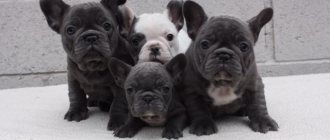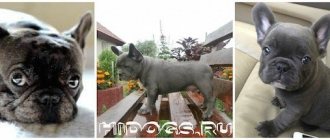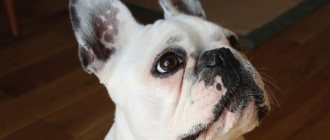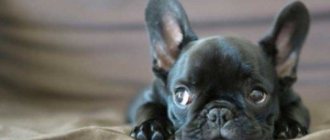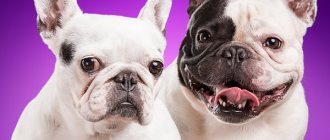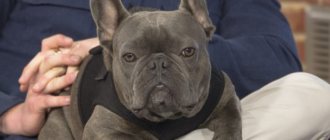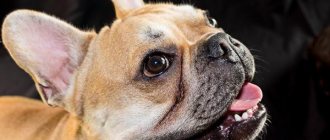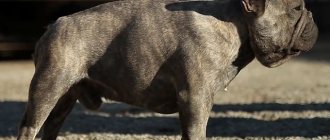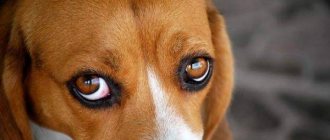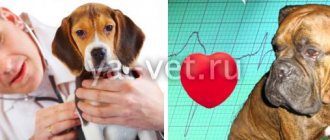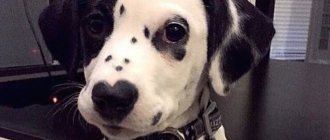- French Bulldog
Each breed of dog has a predisposition to certain diseases.
We have collected information about typical diseases of the breed. Remember the symptoms of the disease, which every pet is at risk of developing, and then you can help him in a timely manner. The French Bulldog is the ideal companion dog. They were bred in England, they accompanied English lacemakers in France, where they acquired their nickname “Frenchwoman”. In addition to being companions, they once served as excellent rat catchers, but today their job is focused on being the ideal family friend.
- Country of origin : UK
- Height at withers : 30.5-31.5 cm
- Weight : 10-13 kg
- Lifespan : 10-14 years
- Use : companion dog
Allergies in the French Bulldog: types, symptoms, signs, treatment
An allergy is a reaction of the immune system caused by an allergen. Allergens include: food, as well as proteins from plants, animals and insects.
The immune system's reaction can have a detrimental effect on the French Bulldog's body. Over the course of several years or months, periodically the allergen can increase sensitivity and cause an overreaction of the immune system. Most often, the body protects the animal from infections, but the reaction of the immune system will have a devastating effect on it. Allergic reactions are quite difficult to tolerate. Allergen molecules combine with antibodies in the blood and then attach to mast cells. These cells are found throughout the body in animal tissues. The reaction of antibodies and antigens with mast cells causes a substance that has a very strong effect on the body. For example, histamines, they cause inflammation in the form of itching, swelling and redness of the pet's skin. Such inflammation leads to signs of an allergic reaction.
The symptoms of a French Bulldog vary, for example:
- Your pet's face, lips, nose, eyelids, ears, or earmolds may become swollen. Possible itching in the ears, eyes, nose. Sometimes sneezing and coughing in a dog is a sign of an allergic reaction. Another symptom is a disease of the digestive tract, a sign of which is diarrhea and vomiting. There may be hives or red, inflamed skin.
- In French Bulldogs, skin itching is most common, either in one area (localized) or over the entire body (generalized). Sometimes the symptom is accompanied by wheezing, sneezing, or a completely disrupted respiratory system. Allergies can affect the digestive system, in such cases diarrhea and vomiting are observed. There may also be discharge (liquid) from the nose and eyes.
Allergies are quite common in dogs, regardless of breed and origin. This happens due to the fact that there are a very large number of substances that act as allergens. Most often, allergies appear in dogs that are six months old or affect pets older than one or two years.
Allergens that cause allergies in animals:
There are a huge number of substances that at first glance are completely harmless, but in fact cause allergies in the French bulldog and act as an allergen. Allergies can be caused by small chemical molecules or proteins of animal, plant, or insect origin.
Examples of allergens:
Allergies can be caused by pollen or mold spores. Dust mites are also an allergen. Skin cells that cause the same reaction as allergies in humans to animals. The allergen can be insect proteins, most often flea saliva. Sometimes certain medications act as an allergen and cause allergies in a French bulldog.
How to tell if your dog is sick
The owner must monitor the behavior and well-being of the dog. If your French pet behaves restlessly, whines, suffers from insomnia, and does not approach the food bowl, then it should be taken to the veterinarian.
A change in the consistency of feces indicates a digestive disorder. If a bulldog rubs its butt on the floor, this indicates helminthiasis or contamination of the paraanal glands. If there are vision problems, the pet moves timidly and slowly. When a dog intensively itches and licks itself, chews its sides, and fusses, then a parasitic or dermatological disease should be suspected.
The owner must regularly inspect:
- bulldog eyes for inflammation, redness, lacrimation;
- ears for signs of infection and wax blockage;
- wool for the presence of traces of parasites;
- teeth and gums;
- limbs for scratches, wounds, splinters, ulcers, overgrown claws that require trimming.
Allergy
French bulldogs are susceptible to food, contact, and parasitic allergies.
An allergic reaction occurs:
- skin itching;
- rashes;
- stomach colic;
- excessive gas formation;
- nausea;
- diarrhea;
- rhinitis with difficulty breathing;
- redness and swelling of the skin;
- partial hair loss.
The owner must find out what caused the allergic reaction in the bulldog. This could be clumps of faded fur, dust, mold, or pollen. The provoking factor must be removed immediately.
Food allergies are the most dangerous for bulldogs. Representatives of the French breed are capricious in terms of diet; their digestive tract can react negatively even to high-quality food. Most often, the cause of an allergic reaction is the inclusion in the diet of beef, offal, dairy products, and store-bought food with added gluten.
The diet of French bulldogs must be balanced; monotony of products is unacceptable. If your pet shows signs of allergies, then raw meat, eggs, fish, and red vegetables should be removed from the dog menu. It is unacceptable to treat your dog with fried foods, pickles, smoked meats, sweets, and baked goods. Of the cereal porridges, it is better to give rice and buckwheat, since they are hypoallergenic.
Dermatitis
Allergic dermatitis occurs when a French pet, its toys and dishes are washed with inappropriate hygiene products. To avoid illness, you should use baking soda when washing your dog's bowls. Zoo shampoo for dog care should be hypoallergenic. The owner should regularly clean with a damp cloth and ventilate the rooms.
With parasitic allergies, dermatitis is accompanied by large, weeping ulcers. To treat them, you need to cut the hair in the affected areas, and use brilliant green or hydrogen peroxide for treatment.
Since the skin of French bulldogs is delicate, wrinkled, and sensitive to violations of hygiene rules, diaper rash and the accumulation of dirt in the skin folds on the face often lead to skin problems.
Dermatitis in French bulldogs is accompanied by:
- redness of the skin;
- the appearance of spots;
- swelling;
- ulcers and ulcers from scratching;
- skin itching.
The disease is treated comprehensively, using novocaine injections, antibiotics and immunostimulants for oral administration, external antiseptics and medicated shampoos.
Ear diseases
In French bulldogs, ear diseases are associated with mechanical trauma, ingestion of a foreign body, fungal or bacterial infection, or mites.
The following symptoms are possible, depending on the cause of the disease:
- intensive scratching of the ear by a pet;
- swelling, redness;
- rashes;
- purulent discharge;
- lack of reaction of the dog to sounds;
- drooping or broken ear;
- pressing the bulldog's ear to his body.
French bulldogs often have cases of otitis media, an inflammation of the outer ear. Obese dogs are most susceptible to the disease. Urgent treatment is required, as advanced otitis media leads to deafness.
Regardless of the cause of the ear disease, treatment is prescribed by a veterinarian.
Paw diseases
A common disease is achondroplasia. This is underdeveloped paws in a French pet due to impaired growth of bone tissue. The pathology is congenital; it is visually clear which of the growing puppies will be disabled.
Often the skin in the grooves between the toes and paw pads becomes infected. The dog licks the sore paws, tries to gnaw them, which causes inflammation. For treatment, use antiseptic agents prescribed by a veterinarian.
Skin problems
Excessive hair loss in a French Bulldog can be associated with hormonal and non-hormonal problems.
If the skin becomes bald evenly throughout the body, then hormonal imbalance should be suspected. It may be associated with diabetes, hypothyroidism and other endocrine diseases. In this case, the dog becomes obese and the coat becomes dull and thin.
If the baldness is uneven, accompanied by itching, then you can suspect lichen or other parasitic infection, dandruff, or dermatitis. Less commonly, dermatological diseases in a bulldog manifest the body's reaction to stress.
Spinal disease
With diseases of the spine in bulldogs, bones and cartilage are gradually destroyed. The result is the formation of intervertebral hernias, putting pressure on the vessels and nerve fibers in the vertebrae. And the collapsing vertebrae themselves provoke acute pain that prevents you from moving your head.
Representatives of the French breed are most often diagnosed with:
- sphenoid vertebra syndrome - a genetic disease that manifests itself in adulthood;
- osteochondrosis – inflammation of capillaries and nerve fibers due to deformation of intervertebral discs;
- osteochondrodysplasia is a genetic incurable pathology accompanied by growth inhibition and ossification of skeletal tissue.
Treatment is carried out using anti-inflammatory and analgesic medications, chondroprotectors. In advanced cases, surgical intervention is required.
Hind leg failure
The functioning of the muscular system is ensured by the nerve fibers that make up the spinal cord. Diseases of the spine, accompanied by compression of the nerves, lead to decreased sensitivity and even paralysis of the rear limbs of the bulldog.
A sick animal must be carefully placed in a carrier and immediately taken to a veterinary clinic, since diseases of the spine can result in death.
Eye diseases
French bulldogs have large and protruding eyeballs that are easily injured, resulting in an inflammatory process. Therefore, you should not walk your pet in thickets, forests, or littered areas.
One of the common diseases of bulldogs is conjunctivitis, accompanied by:
- redness of the eyeballs;
- lacrimation;
- purulent discharge;
- lethargy and depression of the animal;
- the appearance of ulcers under the third eyelid in the follicular form of the disease.
Canine conjunctivitis is treated with drops of “Sodium sulfacyl” and “Sofradex”. You can use tetracycline ointment. The bulldog's sore eyes are wiped daily with a clean cloth moistened with boiled water.
A common problem associated with French Bulldog eyes is a bulging third eyelid. To avoid suppuration, you should carefully insert the eyelid back. If it is difficult to do this yourself, then it is better to contact a veterinarian.
Diseases associated with physiology
French bulldogs, like all purebred small dogs, have problems with the functioning of the heart muscle. A functional failure of the mitral valve is often diagnosed, accompanied by rapid fatigue, arrhythmia, heaviness of breathing, and a faint state of the animal. The disease is treated by a veterinarian, and the owner must feed the bulldog high-quality food and give prescribed medications to strengthen the heart.
Bulldogs are prone to digestive disorders. Diarrhea is common among them. It can be one-time, associated with poisoning, or chronic, caused by disease. In the first case, the pet should be put on a therapeutic diet for a couple of days. In the second case, it is necessary to consult with a veterinarian, who must determine what exactly is irritating the dog’s intestinal tract.
A French Bulldog may experience convulsive conditions, which indicate:
- epileptic seizures;
- chronic renal or liver failure;
- decrease in blood glucose concentration;
- rabies;
- poisoning;
- diseases of the heart muscle;
- inflammatory process in muscle tissue.
Seizures associated with heart disease are especially dangerous. To establish the exact cause of the phenomenon, the French pet needs to be shown to a veterinarian.
Breathing and related problems
A large head and a short bridge of the nose with curved nasal passages are the anatomical causes of breathing problems in representatives of the French breed.
A healthy pet breathes with a barely audible wheeze. The situation worsens in hot weather, when the air is steamy, and also when the animal is obese. There is a high probability of getting heatstroke, accompanied by heavy and hoarse breathing and a blue tongue. If such a problem occurs, the bulldog should be doused with cool water and immediately taken to a veterinary clinic.
In winter, bulldogs often get colds and rhinitis. This is due to the fact that the air passing through the short nasal passages does not have time to warm up upon reaching the lower respiratory tract.
Urgent surgery is required for a dog that is breathing heavily, noisily, with its mouth slightly open, and coughing up mucus profusely. Such symptoms indicate stenosis of the paranasal sinuses or blockage of the tracheal tube.
Difficult birth
Breeding French bulldogs is problematic due to hormonal imbalances and a weak reproductive system. Males are often diagnosed with infertility, females have difficulty bearing offspring and cannot give birth without human help.
Due to disrupted hormonal levels, the giving birth female experiences weak or no attempts at all. It is not uncommon for a French pet to give birth to have a caesarean section.
If the owner does not know how to deliver a baby, then a veterinarian should be called. The first puppies usually emerge normally, then the pushing weakens and stops, and the litter remains in the uterus. The veterinarian injects a uterine contraction stimulator. It happens that a puppy gets stuck in the birth canal. You need to carefully pull it out.
The most common diseases of French bulldog dogs
A predisposition to a disease does not mean that every French Bulldog will have it. Closely monitor your pet's condition and activity. If you see something wrong in your pet's behavior, it is best to contact a veterinarian.
The following diseases are not common in the breed, but they can occur:
- Hip dysplasia . This is an inherited condition in which the hip bone does not fit tightly into the hip joint. In some dogs it causes pain and lameness in one or both back legs, but in other dogs it may not cause any discomfort. X-rays are the most accurate way to diagnose the problem.
- Brachycephalic syndrome . The disease occurs in dogs with a short muzzle, narrowed nostrils, or a long or soft palate. Their airways are closed to varying degrees and can cause anything from noisy or difficult breathing to complete airway collapse. Dogs with brachycephalic syndrome typically wheeze and snore. Treatment varies depending on the severity of the condition.
- Allergy . Allergies are a common disease in dogs. There are three main types of allergies: food allergies, which are treated by eliminating certain foods from the dog's diet; contact allergies, which are caused by reactions to substances such as bedding, fleas, dog shampoos and other chemicals; and inhalant allergies, which are caused by airborne allergens such as pollen, dust and mold. Treatment varies depending on the cause and may include dietary restrictions, medications, and environmental changes.
- Knee dislocation . This is when the knee joint (often the back leg) slips inward, causing pain.
- A malformation of one or more vertebrae that causes it to be triangular in shape. This malformation can occur on its own or with other vertebral malformations.
- Von Willebrand's disease : Found in both dogs and humans, this is a blood disorder that affects the clotting process. A sick dog will have symptoms such as nosebleeds, bleeding gums, prolonged bleeding after surgery, and sometimes blood in the stool. This disorder is usually diagnosed between the ages of three and five and has no cure.
Contact allergy
Contact allergies can be caused by the use of hygiene products and cosmetics in pet care that are not suitable for the pet.
To eliminate the possibility of contact allergies, the following rules must be followed.
You should wash your pet's dishes using mustard and soda..
When purchasing shampoo for your French bulldog, you must choose a hypoallergenic option.
If an allergy to dust and mold is detected, you should get rid of the allergen by all possible means, carry out wet cleaning more often, and ventilate the room.
Even frequently shedding fur can become a prerequisite for the disease.
In this regard, you should carefully care not only for your pet’s skin (especially in the folds on the face), but also for its fur.
The dog scratches its back strongly, closer to the tail; at first, a bald spot appears on the coat.
This then spreads along the length of the spine, accompanied by large, weeping scratches.
The main reasons may be: the presence of parasites or inflammation of the paraanal glands.
To cure irritation, it is necessary to remove the hair around the sores and treat the affected areas with hydrogen peroxide and brilliant green.
The French Bulldog does not have problems with tails, since they are not docked. However, we should not forget about the prevention of diaper rash.
If an allergy to parasites is detected, measures to eliminate them are immediately taken: not only the dog is treated with specialized means, but also its habitat.
Infectious diseases
Treatment of French Bulldog dogs is always a costly and expensive matter, especially if the disease is severe. Therefore, it is worth more closely monitoring the health of your dog and preventing disease by paying due attention to preventive measures.
A real test for both the dog and all family members is the pet’s infectious diseases. These include the following: plague, enteritis, ringworm and leptospirosis. Treatment for the dog will take quite a long time and it will need constant care. For example, trichophytosis is difficult to treat.
To cure a dog of ringworm, more than just medications are needed. It is necessary to carry out a number of comprehensive measures for the pet’s recovery:
- regular disinfection of toys, beds, kennels and other “personal belongings” of the dog, as well as the room where he is constantly located, in order to destroy the fungus;
- it is necessary to completely isolate the dog from all family members and other animals;
- organize proper nutrition and proper care.
Most infectious diseases are transmitted through contact with sick animals. This includes not only other dogs, but also cats and wild animals. This is how, for example, lichen and plague are transmitted.
Preventative measures to protect your dog:
- It is necessary to minimize your dog's contact with other dogs you don't know, especially strays. Don't let your dog off the leash, so you can control his behavior and communication with other dogs. To become infected with distemper, a healthy dog only needs to touch the nose of a sick animal. In most cases, this disease is transmitted during sniffing. And for infection with trichophytosis, just one touch with a sick dog affected by lichen is enough. Of course, it is extremely difficult and unnecessary to completely exclude your dog from communicating with others. The dog must be socialized! Here are two such contradictory points that you will encounter. Just choose dog lovers as friends who take care of their dog. If you adhere to this, you will eliminate the risk of pathogen transmission by 80%.
- Do not walk your French Bulldog in dump sites. It is garbage that attracts most rodents, in particular rats - carriers of various infections. Gray rats are carriers of a serious disease - leptospirosis, which affects both dogs and people.
- Don't let your dog sniff other people's feces. This is a source of helminths.
- Monitor your dog's well-being closely. Pay attention to even the most minor changes. Perhaps the dog became lethargic, his appetite disappeared, and his nose became dry. Or you began to notice that the dog sheds profusely, and this has nothing to do with seasonal shedding. Excessive hair loss is the first sign that your dog has health problems. All of the above may be symptoms of serious illnesses. And only you can prevent them. If you detect and take your pet to the veterinary clinic on time, the easier it will be to defeat the disease. You should not ignore the symptoms, otherwise it can lead to serious consequences. Advanced infections are much more difficult to treat, and sometimes even impossible. The dog either dies or suffers serious complications such as loss of vision, hearing, paralysis of limbs, and so on.
- Keep all necessary vaccinations for your French Bulldog dog on schedule. This is one of the most effective methods of prevention. But before vaccinations, it is imperative to treat helminthiases.
Ear disease
The most common ear disease in French Bulldogs is otitis externa.
The causes may be water, dirt, or insects caught in the ear.
It is necessary to observe safety measures not only while swimming, but also while walking. The main sign of the disease can be considered restless behavior:
rolls around on the floor and scratches his ears. The external manifestation of otitis externa is discharge from the ear in the form of pus .
During the treatment, the ear is cleaned with a cotton swab, then the ear canal is treated with an ointment based on zinc and fish oil (again after two days).
Care and maintenance
Following simple rules for the care and maintenance of French bulldog dogs can prolong his life and make your coexistence as comfortable as possible.
- The coat should be brushed 2-3 times a week with a soft massage brush. In addition to removing dead hair, blood circulation improves and cleanses from dirt and dust. During periods of shedding, the coat should be brushed daily.
- You don't need to wash your dog often. Once every 2-3 months is enough. After washing, be sure to thoroughly dry the dog and dry the coat with a hairdryer, since the breed is very sensitive to cold and drafts.
- After walks, you should wipe your paws and take care of the skin on your toe pads.
- The weak point of French bulldogs is the folds on the head, where diaper rash and inflammation can occur. Wrinkles must be wiped daily to remove moisture and dirt. Be sure to do this after feeding.
- The French Bulldog's ears should be cleaned of wax and dirt 1-2 times a week with a cotton pad soaked in hydrogen peroxide.
- Every day you need to wipe your dog’s eyes with a soft cloth or cosmetic disc soaked in boiled water. If your eyes become very acidic, you can wipe them with chamomile decoction or brewed tea.
- The French Bulldog's nails need to be trimmed with a nail clipper 2 times a month.
- Once a week you should clean your teeth from plaque with a special soft brush and paste for dogs. During the period of changing teeth, it is better to show your pet to a veterinarian and, if necessary, remove milk teeth if they interfere with the eruption of permanent teeth.
- “Frenchies” cannot tolerate both cold and high temperatures. They catch colds or get sunstroke easily. Therefore, in cool weather, they should definitely be dressed in warm, windproof suits, shoes and hats. In the summer, it is necessary to limit walks in the sun and walk more in the evening.
- It is better not to bathe pets in bodies of water. Firstly, they may get sick afterwards. Secondly, it is physically difficult for the Bulldogs.
- In the house, the dog must have its own corner - bedding or a house, in a cozy place protected from drafts.
- Due to low physical activity, a bulldog only needs 2 short walks during the day. There is no need to exhaust your pet with long runs and long active games.
- Bulldogs often experience increased salivation, heavy snoring, and gas during sleep. If the manifestations of flatulence can be regulated through a properly selected diet, then snoring and salivation cannot be influenced - the owners must be prepared for this.
Description of the breed
It would be true to say about these dogs that true beauty lies within. The height of the French Bulldog is 24-35 cm. Weight is 8-14 kg.
The body shape is square, the back is strong, the loin is convex, short. The developed chest is barrel-shaped, deep, the stomach is tucked. The neck is short and muscular, without dewlap. The tail is initially kinked, not docked, short and straight, set low. It is thick at the base and tapers slightly towards the tip.
The legs are muscular and strong, the front legs are shorter and smaller than the hind legs. Due to this, there is a slight rise from the withers to the lower back, the croup is inclined. The forelimbs are slightly turned out. Movements are measured, free, bow-legged gait.
The massive head is square in shape, symmetrically covered with wrinkles and folds. The skull is flat between the ears, the forehead is convex with developed brow ridges. There is a furrow between them. The transition from forehead to muzzle is sharp. The muzzle is square, snub-nosed. The nose is wide and black. The maxillary and nasal bones are shortened.
The lips are thick, fleshy, black, drooping slightly, but hide the teeth. The lower jaw protrudes forward and curves slightly upward. A snack is normal. The jaws are massive.
French Bulldog dogs have expressive, intelligent eyes. They are large, dark, round, and widely spaced. The ears are large, thin, triangular in shape, rounded and erect. Their appearance resembles the wings of a bat.
The coat is short, soft and silky, lying close to the body. There is no undercoat. The color of the French bulldog is very diverse - from light fawn to red, brindle or plain, with or without spots. The standard describes:
- fawn - white spots are allowed on the belly, chest and neck and a white blaze on the forehead towards the nose
- white and brindle
- brindle - can be either red on a black background or vice versa
- fawn white
- spotted
- beige, cream
What to feed
French Bulldog dogs are susceptible to allergies, so food should be selected especially carefully. When choosing ready-made dry food, you should give preference to premium and super premium category food or food from the “holistic” series.
Natural nutrition is also possible. To create a balanced menu and select the optimal vitamin and mineral supplements, it is better to consult a veterinarian.
A French Bulldog's diet should include the following foods:
- lean meat (beef, veal, lamb, horse meat, rabbit) - can be given raw
- boiled offal
- cereals - buckwheat, rice, barley, oatmeal
- fermented milk products - kefir, cottage cheese
- fruits
- vegetables - both raw and boiled, stewed. Pumpkin, zucchini, cucumbers, carrots and beets are especially suitable
- boiled sea fish without bones 1-2 times a week
- Once a week you can give a boiled chicken egg or several quail eggs
It is important to maintain the ratio: 70% comes from animal proteins, 30% from everything else.
To maintain the health of your pet, you should not feed it from the table and give it the following products:
- fatty meat, especially pork, puts a lot of stress on the liver and digestive tract
- confectionery products lead to obesity and the development of diabetes mellitus
- whole milk - not digestible in the body of an adult dog
- smoked meats, marinades, spices - place an increased burden on the gastrointestinal tract, are carcinogenic, and can cause allergies.
- potatoes and legumes - lead to bloating
- tubular bones
There is no need to often give your pet hard bones, as this will lead to increased tooth wear. The dog should always have a bowl of clean water freely available. If the dog does not eat the entire portion at once, the remaining food must be removed.
History of origin
From the name of the breed it is logical to assume that it originated in France. But the homeland of these dogs is England, Nottingham. Craftsmen, including seamstresses and lacemakers, wanted a compact friend who could accompany them at work and protect the premises from rodents. French Bulldogs were excellent at these tasks.
Soon, the scientific and technological revolution led to the fact that manual labor was no longer needed and workers with their pets were forced to move to neighboring countries, most of them to France. It was here that the local nobility became interested in small, perky dogs. Gradually the breed became more and more popular, and in 1896 it was first presented at an exhibition, where it found its admirers.
In Russia, the first famous fan of French bulldogs was F. Chaliapin, who was fascinated by these dogs, rough on the outside but loving on the inside.
